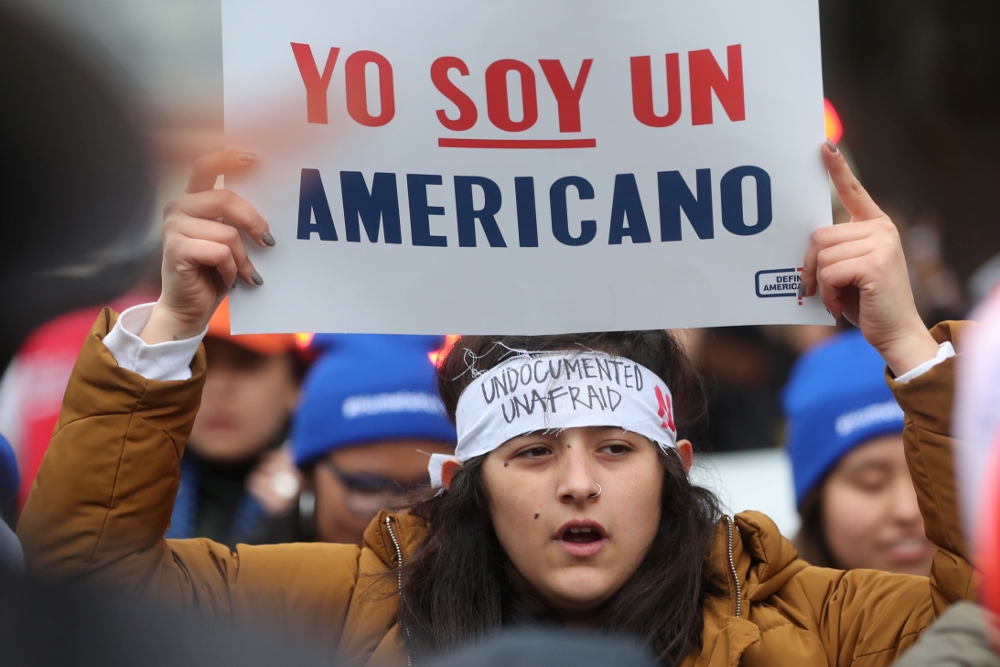
A demonstrator holds a sign outside the U.S. Supreme Court in Washington Nov. 12 as justices hear arguments in a legal challenge to the Trump administration's bid to end the Deferred Action for Childhood Arrivals program. The placard reads, "I am an American." (CNS/Reuters/Jonathan Ernst)
As the Supreme Court heard arguments Nov. 12 to decide the fate of the Deferred Action for Childhood Arrivals program, Catholic organizers joined thousands of demonstrators in voicing their support for the program and called on Congress to provide a more permanent solution going forward.
"We won't know the Supreme Court's decision until the summer of 2020, but that means we just have a lot of time to pressure the Senate to pass the Dream Act to give us an actual solution that will give us a pathway to citizenship," José Arnulfo Cabrera, a DACA recipient and director of education and advocacy for migration at Ignatian Solidarity Network, told NCR.
Arnulfo Cabrera was one of dozens of Catholics who participated in a rosary walk outside of Washington's Union Station before marching to the Supreme Court building to join thousands of other demonstrators. The event was co-sponsored by Network, Ignatian Solidarity Network, Faith in Public Life, Leadership Conference of Women Religious, the Association of Jesuit Colleges and Universities, the Jesuit Conference Office of Justice and Ecology, and the U.S. Conference of Catholic Bishops' Justice for Immigrants campaign.
"We're not just praying for the justices to be on the right side today. We're praying for our elected officials to wake up and finally give a solution to the 700,000 DACA recipients living in this country," Arnulfo Cabrera said at the rosary walk.
At the same time the activists were praying, justices inside the Supreme Court were preparing to hear arguments on three cases concerning the Trump administration's 2017 decision to repeal DACA — an Obama-era program that protects from deportation about 700,000 undocumented immigrants who came to the United States as children and allows them to work. DACA is renewable every two years but does not provide a pathway to citizenship.
Several lower courts have ruled that the Trump administration's decision was not sufficiently justified. However, The New York Times reported Nov. 12 that the Supreme Court's conservative majority appeared to consider the administration's explanations for the repeal acceptable. CNN reported Nov. 12 that it was not entirely clear how Chief Justice John Roberts and Justice Brett Kavanaugh would vote, although their questions seemed to hint they believed the government was on solid ground.
Advertisement
According to Vox, even if the lower courts' decisions were affirmed, the Trump administration could still eventually move forward with the repeal by providing better justifications.
Two other possible outcomes of the Supreme Court cases could be to either allow the Trump administration to move forward with its decision to end the program, or it could deem DACA unlawful and prevent any future president from reviving it.
Giovana Oaxaca, 22, a government relations associate with NETWORK and a DACA recipient, told NCR it is unclear what exactly a DACA repeal might look like. "So right now the strategy is to get everyone who can renew to renew, so that rolls over" and if the program ends this summer, "you still have your status until the end of that period."
Arnulfo Cabrera, 24, said that although he does not want to lose his DACA status, the goal of activists should be to secure a pathway to citizenship for DACA recipients so "we are finally recognized as the Americans that we are."
"It's about human dignity. Every DACA recipient can only live their life in two-year increments — you can't live your life that way," he said.
The Supreme Court hearing fell on the same day that the U.S. bishops' conference elected its first-ever Latino president, Los Angeles Archbishop José Gomez, a native of Mexico and leading advocate for immigrant rights.
In a tweet, Gomez said his election as president "is an honor — not only for me," but also "for every Latino Catholic in the country."
The bishops' conference has been vocal about its support for DACA since President Donald Trump announced his decision in 2017, a move the conference called "reprehensible."
According to a Nov. 12 statement, the U.S. bishops' conference filed an amicus curiae brief in the DACA Supreme Court cases, arguing that "rescinding DACA without considering crucial facts underlying the program irreparably harms hundreds of thousands of families by placing them at imminent risk of separation, which violates the Administrative Procedure Act (APA), and is thus unlawful."
In contrast to Trump's morning tweet about DACA recipients, Bishop Joe Vásquez of Austin, Texas, chairman of the bishops' Committee on Migration, said in a statement, "DACA youth are leaders in our parishes and significant contributors to our economy and communities. They are hard-working young people who know the United States as their only home. We continue to urge Congress and the President to work together to find a permanent legislative solution to the plight of all DREAMers, including DACA beneficiaries."
[Jesse Remedios is a Bertelsen editorial intern with the National Catholic Reporter.]








